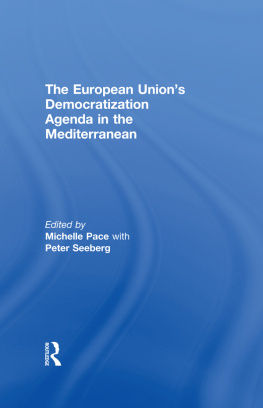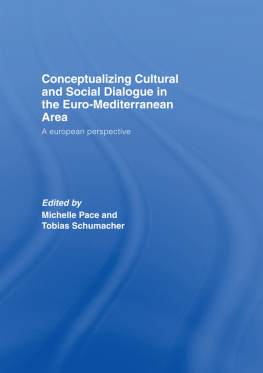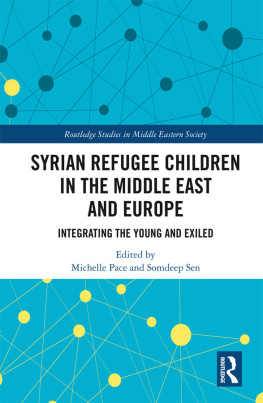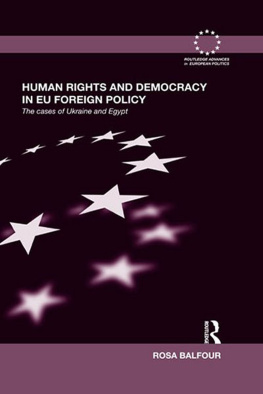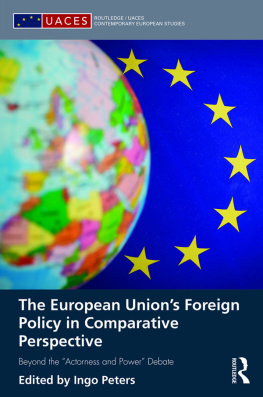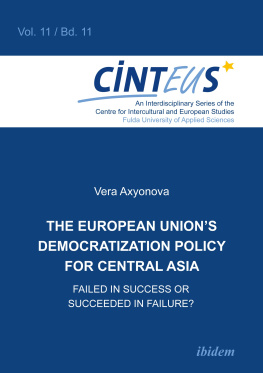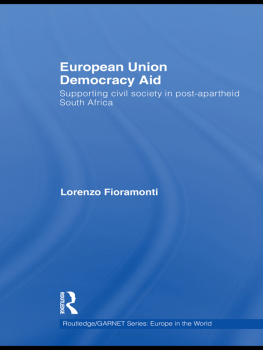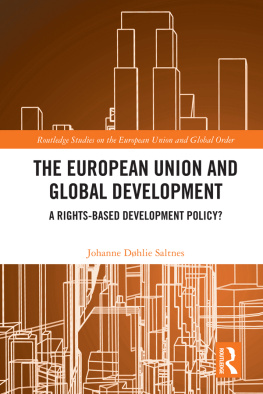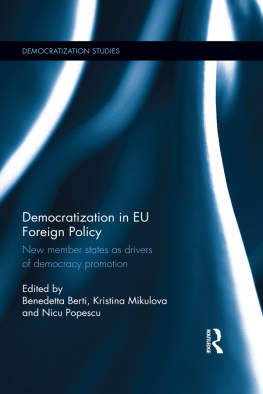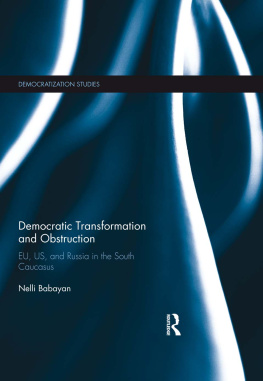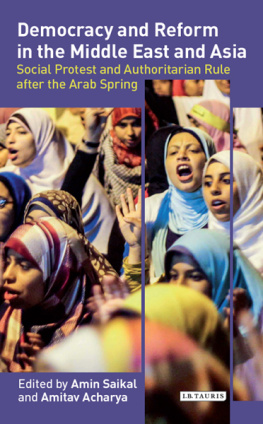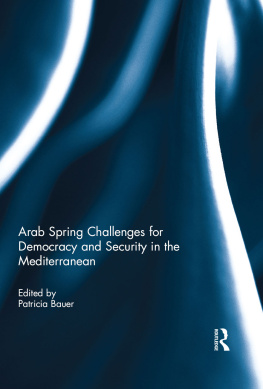The European Union's Democratization Agenda in the Mediterranean
Democracy promotion in the Middle East and North Africa (MENA) remains a central pillar of the foreign policy in the European Union (EU). Rather than concentrating on the relations between the incumbent authoritarian regimes and the opposition in the relevant countries, and on the degree to which these relations are affected by EU efforts at promoting democracy, human rights and the rule of law (an outside-in approach), this collection of chapters inverts the focus of such relationships and attempts to look at them inside-out. While some contributions also emphasise the outside-in axis, given that this continues to be analytically rewarding, the overarching thrust of this book is to provide some empirical substance for the claim that EU policy making is not unidirectional and is influenced by the perceptions and actions of its targets. We thus focus on domestic political changes on the ground in the MENA and how they link into what the EU is attempting to achieve in the region. Finally, the self-representation of the EU and its (lack of a) clear regional role is discussed.
This book was published as a special issue of Democratization.
Michelle Pace is Senior Research Fellow and RCUK Fellow, POLSIS at the University of Birmingham. She is Principal Investigator on two large projects and has published widely on EU policies towards the wider Mediterranean.
Peter Seeberg is Associate Professor, Ph.D. Director of Studies at the Centre for Contemporary Middle East Studies, University of Southern Denmark. He has published on the EU and the Middle East, Arab nationalism, migration issues and ethnic minorities in Europe and Denmark.
The European Union's Democratization Agenda in the Mediterranean
Edited by Michelle Pace with Peter Seeberg
First published 2010 by Routledge
2 Park Square, Milton Park, Abingdon, Oxon, OX14 4RN
Simultaneously published in the USA and Canada
by Routledge
270 Madison Avenue, New York, NY 10016
Routledge is an imprint of the Taylor & Francis Group, an informa business
2010 Taylor & Francis
Typeset in Times New Roman by Value Chain, India
Printed and bound in Great Britain by MPG Books Group, UK
All rights reserved. No part of this book may be reprinted or reproduced or utilised in any form or by any electronic, mechanical, or other means, now known or hereafter invented, including photocopying and recording, or in any information storage or retrieval system, without permission in writing from the publishers.
British Library Cataloguing in Publication Data
A catalogue record for this book is available from the British Library
ISBN10: 0-415-55168-4
ISBN13: 978-0-415-55168-7
CONTENTS
Michelle Pace
Michelle Pace, Peter Seeberg and Francesco Cavatorta
Frdric Volpi
Michelle Pace
Are Hovdenak
Peter Seeberg
Sarah Wolff
Thomas Demmelhuber
Francesco Cavatorta
Eva Wegner and Miquel Pellicer
Aye Aslhan elenk
Brieg Tomos Powel
At a time when the processes of political reform in the Mediterranean are going backwards rather than forwards, and when there are calls for strong voices in Europe, the US, and elsewhere to speak out and condemn the authoritarian Regimes' tight reign on their populations in the MENA region, engagement with concrete alternatives on the ground are most urgent.
It is in this spirit that this book brings together an active group of academic researchers. The origins of this group lie in an Encuentro, a meeting of UK and Spanish specialists on the Mediterranean and the Middle East, held in Barcelona between 1011 March 2006, sponsored by the British Council and coordinated by Richard Gillespie and Ivn Martn. A guiding principle of this endeavour has been the need to address the needs of early career researchers and, in particular, to facilitate the entry of PhD researchers, close to submitting their thesis, into the wider academic community. Besides that, the Encuentro made clear the need for longer term enhancement of research activity by establishing frameworks and infrastructures that will last, and that include close interaction with the policy-making community and the media. The need to promote interdisciplinary approaches and comparative studies in the EU-MENA region was also emphasised.
Thus, in April 2007, with the generous financial support of the University Association for Contemporary European Studies (UACES), the British International Studies Association (BISA) working group on International Mediterranean Studies, the Faculty for the Humanities & the Institute for History and Civilization (University of Southern Denmark), the Danish Ministry of Foreign Affairs, the Danish Egyptian Dialogue Institute (Cairo) and the European Research Institute (Birmingham University), Peter Seeberg and I co-organized a workshop on the EU's democracy promotion in the Mediterranean region at the Centre for Contemporary Middle East Studies in Odense, Denmark. Our agenda was not just to have an academic discussion on the topic but to attempt to engage with the policymaking community: thus, the different panels offered a critical investigation of the recent emergence of socio-political movements in the wider Mediterranean and the EU's postcolonial legacy.
This book is the fruit of all the work that this team of new and older generations of researchers has put together since that workshop in the hope that our voices will contribute to a more nuanced and informed EU policy towards the MENA. Most of us have carried out extensive field research on the ground in this region and thus we also attempt to bring to our readers the recurring themes in the reflections of the people we interviewed and whose calls for a more pluralistic society in their area we seek to represent. I wish to sincerely thank all those who were directly or indirectly involved in this project and can only hope that our policy recommendations find some sympathetic ears for action in the corridors of Brussels.
Finally, but not least, I would like to thank the British Academy and the Economic & Social Research Council for project grants which facilitated my own contribution to this project.
Michelle Pace, Birmingham, 15 October 2008.
Michelle Pace
School of Law and Government, Dublin City University, Dublin 9, Ireland
Introduction
Democracy promotion in the Middle East and North Africa (MENA) remains a central pillar of the foreign policy of both the European Union (EU) and the United States (US), despite the failure of democracy by imposition in Iraq. A recent relative military success in fighting insurgents still leaves a problematic political reality where war-lordism and a weak central government make democracy a difficult goal to achieve. Despite the embedding of the Iraqi government's control, the growing numbers of actors who seem prepared to take part in politics according to democratic norms/rules of the game may yet be outflanked by extremists. The fragmentation of Shi'a and Sunni communities into numerous sectarian political organizations and the reluctance of many Sunnis to participate in formal politics mean that some eschew violence while others perpetrate violence on a daily basis.

